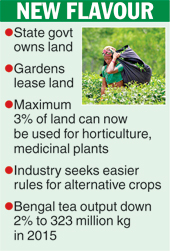
Calcutta, March 25: The state plans to relax the norms for alternative cropping in the tea gardens of north Bengal and may consider the possibility of increasing the permissible area for such cultivation.
"There is a plan to let tea gardens diversify to other crops. This will hopefully result in some improvement from the present situation," state chief secretary Basudeb Banerjee said.
According to West Bengal Estates Acquisition Act, 1953, the land used to cultivate tea in the state technically belongs to the government and is leased out to several companies for a certain period.
Under the act, the lessee or the company, without reducing the plantation area, may use the land for horticulture and growing medicinal plants on an area not exceeding 3 per cent of the total grant area of the garden.
Industry experts maintain that growing medicinal plants such as pepper, areca nut, turmeric, betel vine and acid lime are viable options in Bengal.
"At present, the land area permitted for alternative cropping in tea gardens is insufficient. We are asking the government to be more liberal about it. Moreover, the tea companies are suffering huge losses. Relaxing the rules for cultivating alternative crops may help the industry here," an industry veteran said.
Bengal's annual production dipped 1.8 per cent to 323.38 million kg in 2015 from 329.46 million kg in 2014.
The Rungamuttee estate in the Dooars, owned by Tata Amalgamated Plantations, has been cultivating pepper for the some years now.
"In the last five years, we have seen an average production of 1,500 kg per annum," Jagjeet Singh Kandal, managing director of Tata Amalgamated Plantations, told The Telegraph.
The Tatas have four gardens in the Dooars, spread across 3,829.9 hectares, with an annual production capacity of about 5 million kg.
A few gardens in Darjeeling are also planning to produce organic tea tree honey.
"Honey from tea trees are considered exotic across the world and are believed to have more medicinal value compared with regular honey. Besides, we are going organic as that is what is trending among consumers," Anshuman Kanoria, owner of the Tindharia tea estate in Darjeeling, said.










